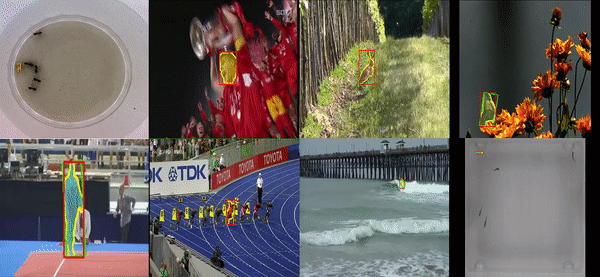Hiring research interns for visual tracking, segmentation and neural architecture search projects: houwen.peng@microsoft.com
💥 We achieves the runner-ups for both VOT2020ST (short-term) and RT(real-time). The variants of Ocean take 2nd/3rd/5th places of VOT2020RT. The SiamDW-T submitted to VOT2019 achieves 1st of VOT2020RGBT (submitted by VOT committee).
💥 Our paper Ocean has been accepted by ECCV2020.
💥 The initial version is released, including Ocean(ECCV2020) and SiamDW(CVPR2019).
💥 We provide a TensorRT implementation, running at 1.5~2.5 times faster than pytorch version (e.g. 149fps/68fps for video twinnings, see details).
Note: We focus on providing an easy-to-follow code based on Pytorch and TensorRT for research on video object tracking and segmentation task. The code will be continuously optimized. You may pull requests to help us build this repo.
🔥 Welcome to subscribe our YouTube Channel.
🔥 Comparision: We summarize the performances of 97 trackers (published in CVPR/ICCV/ECCV/AAAI/NIPS) on 15 tracking benchmarks (OTB13/15, VOT16-20, LASOT, GOT10K, TrackingNet, UAV123, NFS, TC128, VOT2018LT, OxUvA). The repo. is designed to easily compare different trackers, especially when writing papers (performance table/figures). We will continuously update that repo., and we welcome your PR.
🔥 We provide some raw scripts used in our daily research. Some of them may be useful for your daily research. See ResearchTools.
[Paper] [Raw Results] [Training and Testing] [Demo]
Official implementation of the Ocean tracker. Ocean proposes a general anchor-free based tracking framework. It includes a pixel-based anchor-free regression network to solve the weak rectification problem of RPN, and an object-aware classification network to learn robust target-related representation. Moreover, we introduce an effective multi-scale feature combination module to replace heavy result fusion mechanism in recent Siamese trackers. This work also serves as the baseline model of OceanPlus. An additional TensorRT toy demo is provided in this repo.
Paper and Code will be released soon.
-
Advantages: only several lines of code (core part) on Ocean, easy to implement.
-
VOT2020 performances
| Models | Baseline | Realtime |
|---|---|---|
| Offline | 0.444 | 0.436 |
| Online | 0.500 | 0.484 |
[Paper] [Raw Results] [Training and Testing] [Demo]
SiamDW is one of the pioneering work using deep backbone networks for Siamese tracking framework. Based on sufficient analysis on network depth, output size, receptive field and padding mode, we propose guidelines to build backbone networks for Siamese tracker. Several deeper and wider networks are built following the guidelines with the proposed CIR module.
-
Tutorial for Ocean
Follow Ocean [Training and Testing] tutorial
-
Tutorial for SiamDW
Follow SiamDW [Training and Testing] tutorial
experiments:training and testing settingsdemo:figures for readmedataset:testing datasetdata:training datasetlib:core scripts for all trackerssnapshot:pre-trained modelspretrain:models trained on ImageNet (for training)tutorials:guidelines for training and testingtracking:training and testing interface
$TrackSeg
|—— experimnets
|—— lib
|—— snapshot
|—— xxx.model/xxx.pth
|—— dataset
|—— VOT2019.json
|—— VOT2019
|—— ants1...
|—— VOT2020
|—— ants1...
|—— ...
⚓ Release paper and code for OceanPlus.
If any part of our paper or code helps your work, please generouslly cite our work:
@InProceedings{Ocean_2020_ECCV,
author = {Zhipeng Zhang, Houwen Peng, Jianlong Fu, Bing Li, Weiming Hu},
title = {Ocean: Object-aware Anchor-free Tracking},
booktitle = {The IEEE Conference on European Conference on Computer Vision (ECCV)},
month = {August},
year = {2020}
}
@InProceedings{SiamDW_2019_CVPR,
author = {Zhang, Zhipeng and Peng, Houwen},
title = {Deeper and Wider Siamese Networks for Real-Time Visual Tracking},
booktitle = {The IEEE Conference on Computer Vision and Pattern Recognition (CVPR)},
month = {June},
year = {2019}
}
@InProceedings{TVOS_2020_CVPR,
author = {Zhang, Yizhuo and Wu, Zhirong and Peng, Houwen and Lin, Stephen},
title = {A Transductive Approach for Video Object Segmentation},
booktitle = {IEEE/CVF Conference on Computer Vision and Pattern Recognition (CVPR)},
month = {June},
year = {2020}
}
[1] Bhat G, Danelljan M, et al. Learning discriminative model prediction for tracking. ICCV2019.
[2] Chen, Kai and Wang, et.al. MMDetection: Open MMLab Detection Toolbox and Benchmark.
🎯 Further discussion anbout our paper and code: zhangzhipeng2017@ia.ac.cn




